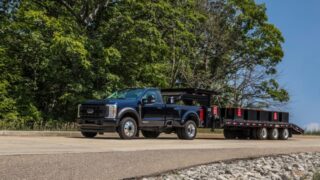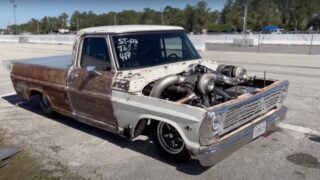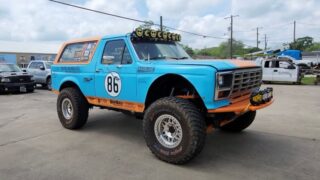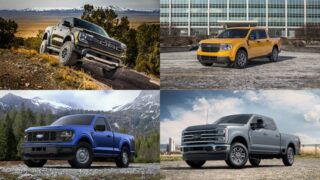CYNTHIA FLANIGAN: FORD SCIENTIST RETURNS TO HENRY FORD’S INITIATIVES WITH NEW SOY-LUTIONS
- As technical specialist, Materials Engineering, Cynthia Flanigan researches sustainable solutions for vehicle materials
- Flanigan played an instrumental role in the development of soy-based seating foam, which is currently in production in eight Ford Motor Company vehicle lines
In her research work, Cynthia Flanigan seeks sustainable solutions that benefit the earth, society, her community and Ford Motor Company, as well as her loved ones and herself.
“My work is all about delivering environmentally beneficial solutions for the world our children will inherit,” said Flanigan, a technical expert at Ford. “In addition, it allows us to utilize local crops and products.”
It has been exciting for Flanigan to take part in the research and development of soy-based seating foam, watching the concept evolve from inspiration to production in eight Ford Motor Company vehicle lines.
Use of agricultural materials is part of Ford Motor Company DNA, as the company founder used soy and other crops back in the 1930s for body panels and paints.
“Henry Ford believed in the partnership between agriculture and the auto industry,” commented Flanigan. “As petroleum resources become scarce, this idea should be revisited.”
Through recent innovations, the Ford team has been able to develop and use bio-based foam seating on more than 1 million vehicles annually. This initiative involved a great deal of trial and error, with odor presenting a significant obstacle.
“The first time we tried to incorporate soybeans in an automotive foam, the results were quite discouraging,” said Flanigan. “We were told it couldn’t be done.”
Ultimately, after trying hundreds of foam formulations, Flanigan and team found the sweet spot that provided all of the required seating foam characteristics, while eliminating potentially objectionable smells.
“I’m responsible for the research and development of new plastics technologies,” said Flanigan. “In many cases, there are environmental or performance advantages over conventional plastics.”
So, how do bio-based plastics support Ford’s sustainability efforts?
“Developing new plastics technologies that use agricultural or sustainable materials cuts down our reliance on petroleum-based plastic,” said Flanigan proudly. “These bio-based materials offer an improvement in their total environmental impact, such as reducing carbon dioxide emissions, and limit the use of finite petroleum reserves. In addition, they support global soy farming initiatives.”
Flanigan attributes the success in bringing this project to fruition to collaboration between Ford engineers, automotive suppliers and farming communities.
Plastic for the 21st century
With the current soy foam usage, Ford is reducing its use of petroleum oil by 1 million pounds, providing for a net decrease of more than 5 million pounds per year of CO2 emissions. This technology is incorporated on products ranging from the entry-level Focus through Ford’s larger luxury SUVs.
What motivates Flanigan and her colleagues to study bio-based plastics?
“We are able to develop new solutions for plastics that will have a positive impact on the environment for us, our children and future generations to come,” said Flanigan. “It has been very rewarding to work in this field.”
Lighter, stronger, greener
“Innovation in our vehicles can take many forms,” Flanigan reflected. “An individual component can be stronger, cheaper or lighter, yet still represent an environmental benefit.”
Over her nine years with Ford, what contribution is Flanigan most proud of?
“We demonstrated that this soy technology could be done, and it has spurred tremendous interest in the industry,” she said. “It is very rewarding to see the expansion of green materials development.”
So, what’s next?
This team of Ford scientists is now researching new opportunities for the “other part of the bean,” soy meal and flour, as filler for a variety of plastics, including rubber. The biomaterials group continues to pursue the development of natural, sustainable materials for interior and exterior parts.
“We believe that our company founder, Henry Ford, would be proud and excited for the new technologies that are coming,” Flanigan said.
Personal Insights and Fun Facts
- Flanigan grew up in Allentown, Pa., and attended Massachusetts Institute of Technology, earning a degree in materials science and engineering. She later earned a Ph.D in the same discipline from Northwestern University.
- The East Coast native didn’t anticipate an automotive career, until she was offered an internship with Ford during college. “The complexity of working in a manufacturing environment was astounding,” she said.
- Flanigan sought a permanent career with Ford after finishing her Ph.D., and she quickly discovered the company was supportive of her sustainability goal of shifting reliance from petroleum to agricultural resources.
- She is the mother of two elementary school children.
# # #
About Ford Motor Company
Ford Motor Company, a global automotive industry leader based in Dearborn, Mich., manufactures or distributes automobiles across six continents. With about 201,000 employees and about 90 plants worldwide, the company’s automotive brands include Ford, Lincoln, Mercury and Volvo. The company provides financial services through Ford Motor Credit Company. For more information regarding Ford’s products, please visit www.ford.com.
Oct. 28, 2009




